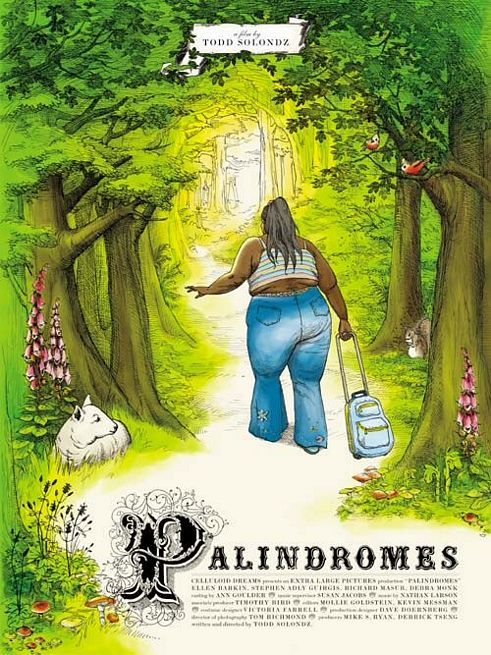
In casual discussions about a given film, there is one word which alerts me to the fact that the person with whom I'm speaking did not understand the piece, or does not possess the vocabulary to interact with it. The word is weird.
In fact, with the exception of Hunter S. Thompson, no one seems able to artfully use the word. Given the chance, I'd gleefully scratch weird, along with its companions, beautiful and something, from the American vernacular. I think that doing so would force my countrymen to think a little more specifically about what they want to communicate.
Point in case: Todd Solondz' weird film Palindromes, which features five different actresses as its main character, Aviva. Aviva, more than anything else, wants to have a baby. As a young teenager, she couples with an awkward young man to achieve this goal. Upon learning of her pregnancy, Aviva's parents force her to abort. After recovering, Aviva hits the road.
Aviva's own name is a palindrome. It starts at the same place it ends up. You can turn it around, travel it backward or forward, start and finish it at either end, and you get the same character. What's more, you can swap ages, actresses, races, places, families, times, and opportunities, and you still come around to the same person: Aviva.
Even if you haven't seen Solondz' other films (Welcome to the Dollhouse, Hapiness), you can probably guess from this cyclical concept that Palindromes is not going to be a story that ends up any happier than it begins. And it begins with a suicide.
So early into the film, as the actors wavered between dramatics and realism, seeming to recite lines, but then seeming to do a good job of acting like the type of characters who would recite lines that way, the word weird came to my mind, and it most certainly fit.
But gradually, as the character became real, as she acted in pursuit of her dream, and as she stumbled from one calamity to the next, I began to realize that every oddity was in the movie for a purpose, and that the film is as artfully symmetrical as its title would suggest, and that, despite the deep despair inherent in its message, this movie is something beautifully weird.
In pursuit of comedic tragedy or tragic comedy (the emphasis chosen might merely reflect the mood of the viewer), Solondz runs from sorrow to sorrow, swapping scenarios, liberally discarding conventions to say to his audience that, despite the conventions of our stories, despite their arcs and twists and reversals, we are who we are.
It would be hard to explain why I felt uplifted by this movie. Perhaps because the vitality of the artistic voice outweighed the gloomy message for me. Perhaps because I enjoy intellectually challenging art. Perhaps because these days I feel so free from the despair the movie plumbs.
Either way, backwards or forwards, tragedy or comedy, Palindromes is a challenging, original, and decidedly weird movie. And I love it for that.